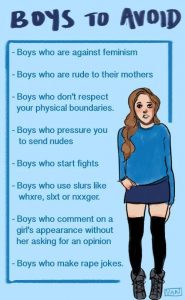To begin, ask the young women if they know the standards in the For The Strength of Youth pamphlet about dating.
- You should not date until you are at least 16 years old.
- When you begin dating, go with one or more additional couples.
- Avoid going on frequent dates with the same person.
- Developing serious relationships too early in life can limit the number of other people you meet and can perhaps lead to immorality.
- Invite your parents to become acquainted with those you date.
Preparing for this lesson brought to mind a quote I saw on Pinterest earlier this month. As far as I know, the author isn’t a Mormon, and I think this advice came from personal experience, and perhaps a little regret:
“Honestly the best piece of advice I can give to younger girls trying to figure life out is to completely ignore boys. I’m not being quirky or cute when I say that, I mean it seriously. Ignore boys’ judgements of you, ignore their insincere compliments, ignore their half-hearted romance. Focus on developing yourself. Practice your art, play sports, do theatre, volunteer, spend time with your friends, but do not put substantial effort into pleasing boys. They’ll be there for you to pursue when the time comes and if you want to. But nothing will waste your youth more than fighting for male acceptance.”
What do you think this author means about wasting your youth? What could you miss out on by being in a relationship with someone when you’re a young woman?
Lots of girls date in high school, usually by pairing up with someone as they are beginning to get to know them, and feel some connection there. That’s not unusual, so why would the church advise to go on several planned group activities before pairing off with one boy? Is it just because the people who wrote the advice grew up in a different era?
Discuss with the girls what’s expected in their peer groups these days. Make sure you understand the norms they’re dealing with, so that your advice will fit their individual circumstances.
So. Step One: DON’T DATE
Part of the reason that we counsel you to avoid boys is that your hormones are still all changing, and they’re very powerful. It takes time to learn your patterns (it’s very common for girls to crave male attention just before their period, for example), and to understand the difference between a decision based on thoughtful planning, an emotional need, or a hormonal reaction.
While you’re still figuring out who you are, you don’t need that added level of complexity.
Learning to communicate with someone else, in a serious relationship, takes up so much time, and it can easily become the main focus of your days. You need time to figure out who you are, and this is the phase of your life for you to do that. Not to mention school, church, extracurricular activities, hobbies and interests, friends, and family.
Your lives are very full, but when we compare ourselves with others, we can still feel left out. What kinds of things can you do when you feel lonely because you don’t have a boyfriend? How can you remember that you have a divine nature, and connect with your individual worth so that you’re not looking for a boy to fill an emotional hole?
Encourage the young women to write down which ideas speak to them, and to add other suggestions. Alternatively, make this into a handout or post it online if you have a shared group.
Here’s a list of things you could try:
- work in the garden, plant some herbs
- cook something you’ve never made before
- spend a day at a museum or art gallery
- meditate, pray, read your scriptures
- make a list of how you want to feel
- read a book you love
- go for a walk in nature
- try a new fruit or vegetable
- make popcorn and have a movie night
- listen to an album from start to finish without doing anything else
- go out for brunch
- create a playlist
- go to the movies
- ride your bike/rollerblades/skateboard
- rearrange your wardrobe
- visit the florist and pick out a bunch of flowers
- donate your old books and clothes to charity
- paint, draw, sketch, write
- visit somewhere new
- send a handwritten letter to a friend
- take a relaxing bath (maybe even with candles)
- write in your journal
- do some yoga
- think of 50 questions and then do some research to answer one
- take a nap
- sip a mug of herbal tea or hot chocolate and look out the window
- have a picnic in the park (bring a book!)
- catch up on your favourite blogs
- plan some travel
- give yourself or a friend a manicure
- wake up early to see the sunrise
- make a gratitude list
And then, Step Two: START DATING SLOWLY
If you’ve accidentally found that one of your best friends is a boy, and you have romantic feelings for each other, so not-dating is not the best solution anymore, what can you do? Or if a young man asks you on a date, and you would like to go, but you don’t know him very well, what’s the smart way to proceed?
Let the young women discuss if they have suggestions or ideas.
When you’re dating someone, it’s very important to keep your eyes opened to who they are. When everything feels magical, it’s easier not to notice them being rude to a waiter. How they treat other people is how they’ll treat you when they become fully comfortable around you. Sometimes, probably the most common scenario you’ll find, is that a boy is very kind and loving, but isn’t a good fit for you – or you grow and change, so that, while you did suit each other when you started dating, you don’t anymore.
Invite the young women to make a list of qualities they’re seeking in their future husband, some that would be nice but aren’t necessary, and some red flags that would make them seriously question their compatibility.
Elder Robert D. Hales said “If you want to marry a wholesome, attractive, honest, happy, hardworking, spiritual person, be that kind of person” (“Meeting the Challenges of Today’s World,” Ensign, Nov. 2015, 46).
What does this mean? What does it have to do with these lists we just compiled?
Discuss how they are planning to develop the qualities they most admire. If you have young women who are (or will soon be) dating seriously, discuss how to notice red flags, and what to do then.
In relationships, everything goes in both directions. We need to make sure that we find someone we fit with, because we are committing to the person we marry. We want to stay with them for eternity, and we should make that path as easy as possible.
When I was a young woman, my YW President taught me that the order of happiness goes like this: happily married, happily single, unhappily single, unhappily married. I saw that in my own life, as my parents had many unhappy years before they divorced, and that was much more difficult than my years as a single person who wanted to be married. It didn’t feel like it when I was lonely, but it was so worth waiting to find this person who I love more than I knew was possible. (Share your own personal experience here, or relate another person’s story that expresses this principle).
The choice of who to marry affects you deeply, and for a long time. We don’t want you to rush into it, we want you to be ready for it. Spend your time now trying to become a person you’re proud of, and keep your eyes open while dating so that you can find someone with whom you can happily spend the rest of forever.







10 Responses
I really liked the paragraph from Pinterest at the beginning – I’m keeping it for when my girls get older. I remember writing a list in YW of the qualities I want in a future spouse. I asked my husband if ever did this in YM and he looked at me like I was nuts and said “Nope.” Our conversation developed into talking about how much exposure we had to lessons re: marriage in YM vs. YW, and *brace yourself* he doesn’t remember any and I recall several. This may reinforce the idea that boys are taught to be boys and develop themselves and some girls go to college expecting and hoping for marriage in the first semester.
I don’t know that 13 year old girls know what qualities are admirable in a spouse. Even after dating as a young single adult I was still figuring that out and really didn’t know what traits were ideal until I was deep in the trenches of marriage (: Were I to teach this lesson I think I’d leave that part out and really stress the other good stuff here – boys are great when it’s time, but until then be a girl, figure out who you are, and enjoy it.
In other words, when we cross over from teaching them to develop themselves as girls and young women to the place of “think about your future husband, who do you want him to be?” we’re rushing them into thinking about marriage. And since the boys get this and the girls don’t, it’s no wonder that for girls, dating (even in H.S.) can be more of a serious venture than it may be for the boys.
I totally agree here. It seems that there is a wide, wide space between positive things a young person can get out of dating and it being linked with marriage. I have one child that is potentially ready to date. There are so many good experiences I could imagine him having that don’t need to be connected to marriage. While a lot of the list of what to look for might be the same: Someone that supports your activities and who you in turn enjoy supporting. Someone you have fun with. Someone that helps you live your values and meet your goals. Someone that respects your boundaries. Full stop. Call that dating or whatever but you needn’t connect those things directly to marriage. Marriage has a whole other set of expanded criteria – similar long term life goals, capability on parenting etc. I remember basically being drawn toward more date like relationships with girls that weren’t Mormon because it was a convenient way to NOT have to worry about the marriage criteria or worry that they were.
Rah, I guess my instinct is to avoid dating someone at all unless I think they’ll fit in my long-term plans (yeah, I didn’t date much), but I absolutely agree that for many people, dating socially can be very rewarding. I don’t know how much of that is from the lessons I received as a YW, and how much was because I was determined not to repeat my parents’ mistake, and how much is just my personality.
Maybe I would have been less scared to connect romantically with other youth if I was taught this over and over, rather than “who you date is who you marry”. Thanks for your comment.
Lots of wise counsel here, Olea. Thank you!
Thanks, Jason!
I want to have more of a conversation about the young women for whom none of this is a reality; how do we teach them, what do we say to them, how do we teach them to value themselves? Make big step lifelong goals? With all this emphasis on dating, and girls never even having boys take a second look at them, even if they are athletic, or smart, or artistic, all the way through high school and college, how do we help buoy them up/lay a good foundation for themselves? It can be nice to say “don’t rush into anything,” but what if there hasn’t been, nor apparently ever will be anything to rush into?
Speaking partly from my own experience and more from experiences of others who I love dearly.
Star, I’m totally with you. I dated one boy, had a couple of crushes, went on 3 first-dates, and eventually ended up engaged to my best friend. I’ll be 30 when we marry later this year: we got engaged in March after 3 months of figuring out if a romantic component worked. I didn’t expect to get married at all, and especially not as a young woman.
I think that one important part is allowing YW the mental space to have their own goals, without expecting to have to set it aside for marriage. That can give them the ability to move forward into a life they love if they don’t find someone with whom they can be happily married. It’s scary (and maybe pointless) to invest too much into a career or big project if you feel like it’ll slip away at some unknown time.
And I think we really need to emphasise self-knowledge. Some of that comes through experimenting: travel helped me learn a lot about myself, for example. If you know who you are and what you care about, you can pursue that, regardless of your romantic life. Waiting to support someone else’s life plan puts young women out of the habit of figuring out what they want to do.